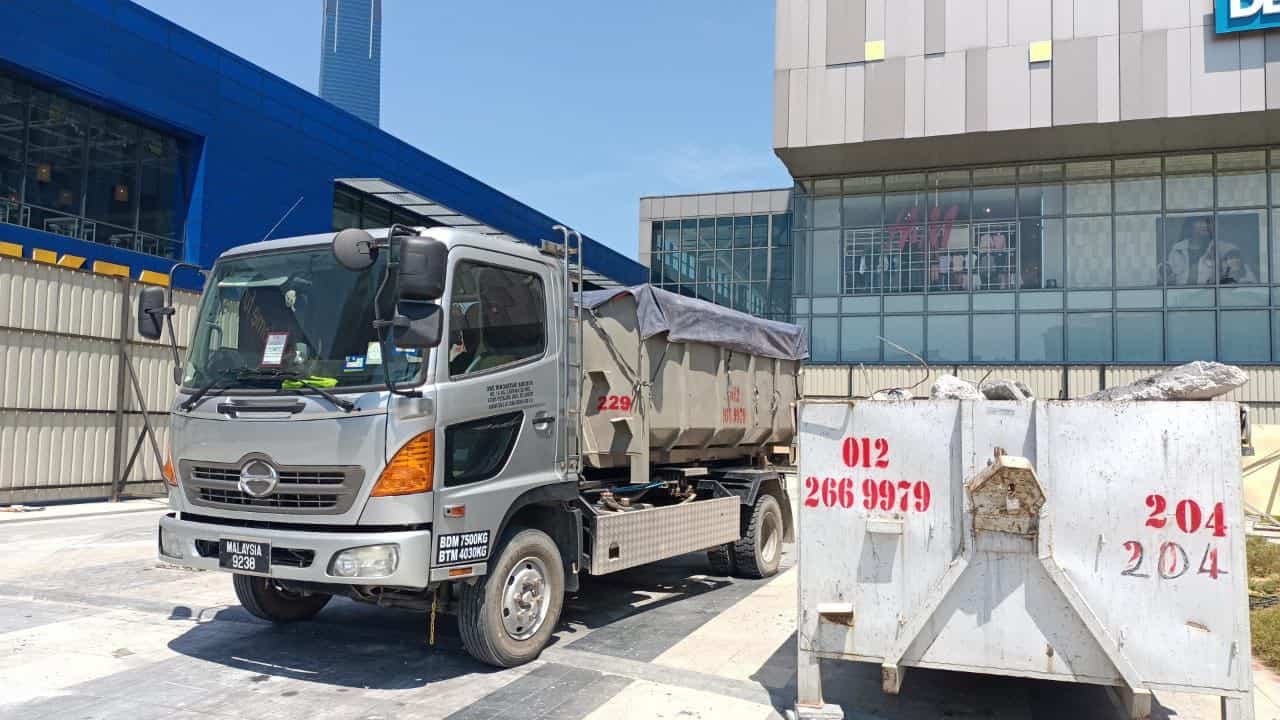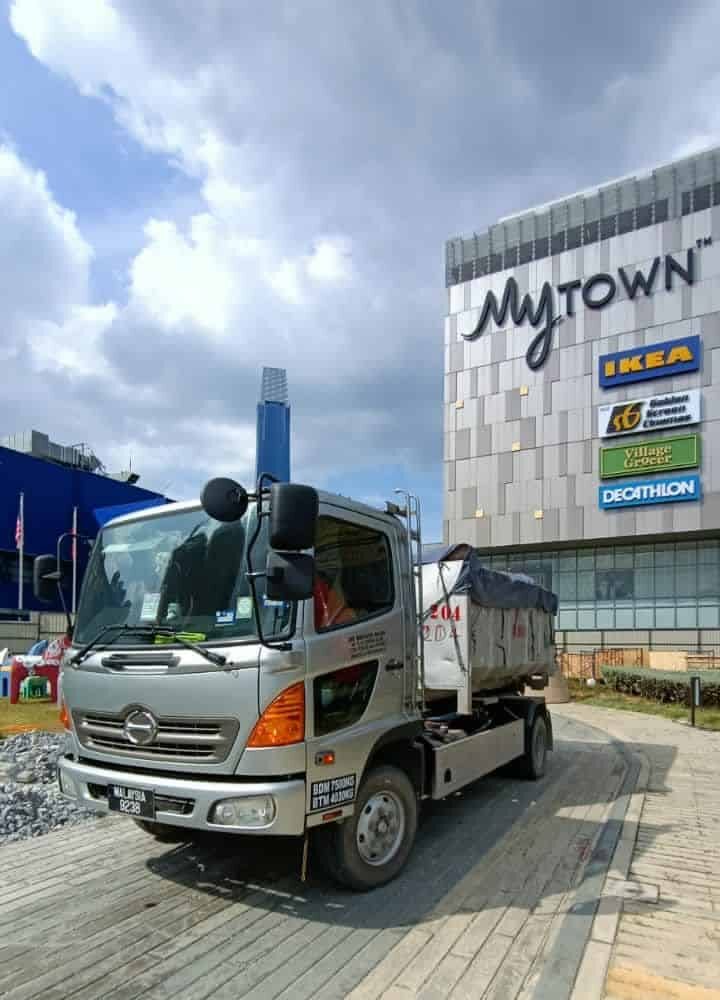RORO BIN RENTAL
Find The Right Size For Your Project

Small Roro Bin
Dimensions: 12′ (L) X 6′ (W) X 2.5′ (H)
Best Use: Heavy construction and demolition waste like concrete and soil.

Large Roro Bin
Dimensions: 12′ (L) X 6′ (W) X 4′ (H)
Best Use: Light-weight construction, industrial, commercial waste, furniture, household bulky waste, trees and etc.

Domestic Roro Bin
Dimensions: 12′ (L) X 6′ (W) X 4′ (H) with roof
Best Use: Domestic food waste (Organic waste).

Extra Giant Roro Bin
Dimensions: 16′ (L) X 8′ (W) X 6′ (H)
Best Use: Light-weight construction, industrial, commercial waste, furniture, household bulky waste, trees and etc.

Giant Roro Bin
Dimensions: 14′ (L) X 7′ (W) X 5.5′ (H)
Best Use: Light-weight construction, industrial, commercial waste, furniture, household bulky waste, trees and etc.
WHAT MAKES US DIFFERENT ?

Value Price

Express Service

Licensed Under Local Authorities

Quick Scheduling
TESTIMONIALS
OUR CLIENTS







PROJECT REFERENCE









Garbage Collection Services
Introduction to Garbage Collection Services
Garbage collection services are an essential part of modern life, helping us manage and dispose of waste responsibly. Without efficient garbage collection, waste would pile up quickly, impacting our health, environment, and quality of life. These services ensure that the garbage generated from homes, businesses, and industries is collected, processed, and disposed of correctly. But what exactly do garbage collection services do, and how do they impact our daily lives?
Types of Garbage Collection Services
Garbage collection is not a one-size-fits-all solution. Depending on the source and type of waste, different services cater to specific needs.
Residential Garbage Collection
This is the most common type of garbage collection service. It focuses on collecting waste generated by households, usually on a weekly basis. Most municipalities provide residents with bins and ensure timely collection.
Commercial Garbage Collection
Businesses produce a considerable amount of waste, including packaging materials, paper, food scraps, and more. Commercial garbage collection services cater to offices, retail stores, restaurants, and other businesses that need regular waste disposal.
Industrial Waste Disposal
Industrial waste is complex and may include hazardous materials that require special handling. Industrial garbage collection services are equipped to handle such waste in accordance with strict regulations to prevent environmental damage.
Benefits of Garbage Collection Services
Garbage collection services bring numerous benefits to communities, businesses, and individuals alike.
Reducing Environmental Pollution
Proper waste management prevents waste from accumulating in landfills and spilling into natural habitats, reducing pollution significantly.
Promoting Health and Hygiene
By collecting and disposing of garbage, these services help reduce disease-spreading vectors like flies, rats, and other pests that thrive on waste.
Enhancing Community Appearance
Clean streets and communities foster a pleasant atmosphere, boosting neighborhood pride and property values.
How Do Garbage Collection Services Work?
Garbage collection services operate on a well-planned schedule, tailored to different neighborhoods and waste types.
Collection Schedules
Most services have fixed days and times for specific areas, ensuring predictability for residents and businesses.
Sorting and Segregation Process
Some waste, especially recyclables, is sorted at designated facilities, where materials like plastic, glass, and paper are separated for recycling.
Transportation and Disposal Methods
Once collected, waste is transported to landfills, recycling centers, or incineration plants depending on the type of waste and environmental regulations.
Types of Waste Collected
Understanding the types of waste that garbage services handle helps us make informed decisions about disposal.
Household Waste
This includes food scraps, packaging, and other everyday items commonly found in residential bins.
Recyclable Materials
Paper, glass, metal, and plastic are collected separately for recycling, helping reduce the demand for raw materials.
Hazardous Waste
Hazardous items like chemicals, batteries, and electronic waste require special handling and are not usually collected with regular garbage.
The Role of Recycling in Garbage Collection
Recycling is a critical component of garbage collection services that helps conserve resources and reduce environmental impact.
Importance of Recycling for Sustainability
Recycling reduces the need for new raw materials, conserves energy, and lowers greenhouse gas emissions, promoting a more sustainable future.
How Garbage Collection Services Facilitate Recycling
Garbage collectors often work with recycling facilities to ensure that sorted recyclables are directed toward the appropriate channels.
Types of Recyclable Materials
Common recyclables include aluminum cans, plastic bottles, cardboard, and glass containers. Properly disposing of these materials allows for them to be reused.
Modern Technologies in Garbage Collection Services
The waste management industry is embracing technology to streamline and improve collection efficiency.
Smart Bins
Some cities have introduced “smart bins” that use sensors to detect when they are full, optimizing collection routes and reducing fuel consumption.
Waste Compactors
Compactors can reduce the volume of garbage, enabling trucks to carry more waste per trip, which is both cost-effective and environmentally friendly.
GPS Tracking for Garbage Trucks
GPS allows waste collection companies to monitor trucks in real-time, plan efficient routes, and ensure timely collection services.
Garbage Collection for Residential Areas
Residential garbage collection is the backbone of waste management for families and individuals.
Types of Services Available for Homes
Services may vary by city but typically include regular curbside collection, recycling pickups, and seasonal bulk waste collection.
The Role of Local Municipalities
Local governments play a significant role in managing residential garbage collection, often partnering with private companies to serve their communities.
Tips for Homeowners
Simple actions, like segregating recyclables, can make a big difference in effective waste management.
Commercial Garbage Collection Services
Commercial waste collection is essential for keeping businesses running smoothly and maintaining a clean working environment.
Importance for Businesses
Efficient waste disposal is vital for businesses to ensure a safe and clean space for employees and customers alike.
Custom Solutions for Commercial Waste
Many garbage collection providers offer custom solutions tailored to the unique needs of various industries.
Recycling and Waste Reduction for Companies
Encouraging recycling within businesses not only benefits the environment but also enhances a company’s image.
Industrial Waste Disposal Services
Handling industrial waste responsibly is crucial for environmental protection and regulatory compliance.
Handling Hazardous and Non-Hazardous Industrial Waste
Proper sorting and disposal of industrial waste are necessary to prevent harm to the environment and human health.
Regulatory Requirements for Industrial Waste
Industries must comply with government regulations regarding the disposal of waste to avoid penalties and environmental harm.
Safe Disposal Techniques
Using specialized techniques, such as incineration and chemical treatment, helps neutralize hazardous waste effectively.
The Environmental Impact of Garbage Collection
While necessary, garbage collection services also have environmental effects.
Reducing Landfill Usage
Diverting recyclable materials away from landfills helps reduce the pressure on these sites and extends their life.
Contribution to Greenhouse Gas Emissions
Waste management contributes to emissions, but efforts are underway to make this process greener.
Ways to Minimize Environmental Impact
Innovative practices, such as waste-to-energy and recycling, are helping reduce the carbon footprint of garbage collection.
Challenges Faced by Garbage Collection Services
Despite its importance, garbage collection is not without challenges.
Common Issues in Waste Collection
Issues like traffic congestion and adverse weather can impact collection schedules.
Dealing with Illegal Dumping
Illegal dumping is a persistent issue that can burden waste collection services and harm the environment.
Addressing Waste Contamination
Non-recyclable items in recycling bins can compromise the effectiveness of recycling efforts.
Choosing the Right Garbage Collection Service Provider
Selecting a reliable garbage collection provider is essential for effective waste management.
Factors to Consider When Selecting a Provider
Look for providers with a good reputation, transparent pricing, and comprehensive services.
Comparing Services and Costs
Evaluate options to ensure you’re getting value for your money and that the service meets your specific needs.
Importance of Certifications and Licenses
Licensed providers adhere to government regulations, ensuring safe and lawful waste disposal.
Tips for Reducing Household Waste
Reducing waste at home not only helps the environment but also lessens the burden on garbage collection services.
Simple Ways to Reduce Waste at Home
Practices like reusing, recycling, and reducing plastic usage can have a big impact.
Benefits of Composting
Composting turns food waste into valuable fertilizer, reducing the volume of waste that needs collection.
Encouraging Recycling in the Community
Communities that embrace recycling can collectively make a positive environmental impact.
Future of Garbage Collection Services
The future of garbage collection is likely to include more eco-friendly practices and innovative technologies.
Innovations in Waste Management
Trends such as automation and AI are making waste management more efficient.
Emphasis on Sustainability
Sustainable practices are becoming a priority for many garbage collection companies.
Predictions for the Coming Years
Expect more green initiatives and smarter waste disposal methods as we move forward.
Garbage collection services play a crucial role in keeping our communities clean and healthy. By understanding the different types of services, their benefits, and their impact, we can appreciate their importance and make informed decisions about waste management. Choosing the right service provider and adopting sustainable practices can make a significant difference in reducing environmental impact.


